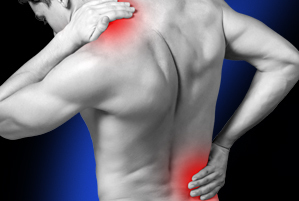
Back Pain is the leading cause of disability in Americans under 45 and most commonly reported kind of pain.
Anatomy of the Spine
The spine is a combination of stacked bones, called vertebrae, flexible tendons and ligaments. These stacked vertebrae comprise a column, which is divided into four regions: cervical, thoracic, lumbar and sacral/coccyx. The spinal cord runs through the column of bones and nerve roots that are critical to the transmission of messages to and from the brain.
Our spinal system is strong enough to protect these sensitive nerve roots, while at the same time allowing us the flexibility to perform all the physical activity and movement of our daily lives, like walking, twisting, bending and lifting. “Sandwiched” between the vertebrae are discs. These discs are spongy pads of cartilage that act as shock absorbers. Each disc, along with the vertebrae immediately above and below, form what is called the spinal motion unit.
Back Pain
Unfortunately, between 80 and 90 percent of the population has back or spinal pain at some point in their lives. A spinal motion unit that moves improperly or is overly strained can irritate nerves, interfere with muscle tension and result in pain. When natural motion is disrupted or an area of the spine becomes dysfunctional, even small movements can cause severe pain, numbness, tingling and even weakness.
Trauma, lifting injuries or other undefined causes can create a spinal disc herniation, which is sometimes referred to as a “slipped” or “bulging” disc. When you have ongoing back pain, early diagnosis and care are important to avoid permanent damage. At my clinic in Rochester, new patients often arrive with these kinds of symptoms. They can arise with normal “wear & tear” from daily activity or from trauma following falls or automobile accidents.
Taking Care of Your Spinal Health
There are many ways to help take care of your spinal health including practicing correct lifting/carrying techniques, mindfully paying attention to your posture, sleeping with a pillow under your knees, quitting smoking, making sure your diet is nutritious and getting enough exercise.
Back pain is one of the most common reasons for healthcare and chiropractic visits but it doesn’t have to be part of your daily life. Many back ailments respond well to conservative treatment, and research and studies have demonstrated successful treatment of back pain and injuries through chiropractic adjustments and care. With chiropractic care, gentle adjustments to any misaligned vertebrae may restore normal movement within the spine, decrease irritation of nerves and reduce pain.
A healthy spine is key to your overall wellbeing. With a normally functioning spine and healthy nervous system, the body is better able to heal itself. Trauma, lifestyle, age, and injury can render the spine vulnerable, but chiropractic care can help alleviate discomfort and assist you along the road to improved overall wellness.
Tips to Prevent Back Pain
- Maintain a healthy diet and weight
- Quit smoking to ensure that maximum oxygen and nutrient amounts reach spinal tissues
- Make sure ongoing chiropractic care is part of your wellness lifestyle
- Be active, avoid leading a sedentary lifestyle
- Maintain proper posture
- Wear properly fitted shoes with customized orthotics
- Warm up and stretch before all physical activities, including chores like yard work
- Lift with your knees, with objects close to your body
- Avoid twisting when lifting
- Talk to your chiropractor about creating an ergonomically correct workstation
Although back pain may be an expectable experience, you don’t have to accept how it limits you. Rush-Henrietta Family Chiropractic’s clinic in Rochester provides patients the resources needed to experience all natural pain relief.



